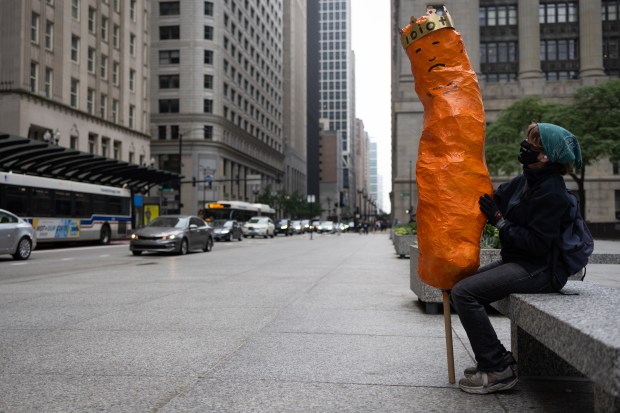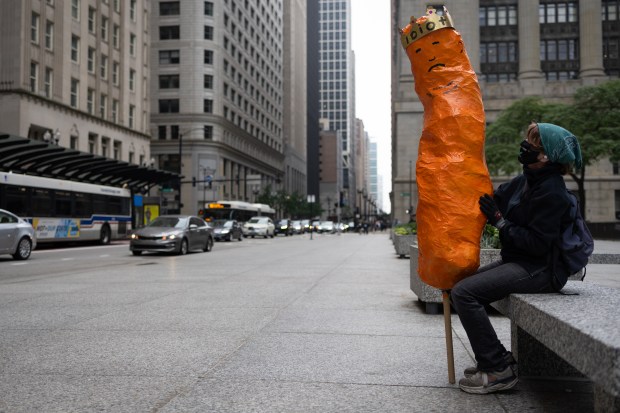Northwest Indiana residents and environmental activists on Wednesday attended a public meeting to voice their concerns about a potential permit for Tradebe.
The Indiana Department of Environmental Management hosted a meeting at Calumet College of St. Joseph in Whiting. IDEM’s Office of Air Quality issues air pollution control permits to sources that emit regulated levels of pollutants into the air, according to the agency.
Tradebe, a Barcelona-based waste management company, has a hazardous waste storage and treatment facility at 4343 Kennedy Ave. in East Chicago.
IDEM’s public meeting focused on a drum shredder at Tradebe’s East Chicago location. A drum shredder is used to break down drums that previously contained waste.
Tradebe has a RCRA empty drum shredder, which is used for drums that stored acutely hazardous waste, according to the Environmental Protection Agency.
The waste management company is one of the largest toxic chemical processors in Lake County, according to the EPA’s toxics release inventory tracker.
Most speakers at the public meeting were concerned about how the drum shredder has operated without a permit for 20 years. Jenny Acker, permits branch chief in IDEM’s Office of Air Quality, said she’s unsure how the drum shredder went unpermitted.
“Once it was noticed that it was there, (Tradebe) was required to submit a permit application to get a permit,” Acker said.
A Tradebe spokesperson did not confirm how long the drum shredder was unpermitted.
Susan Thomas, legislative and policy director for Just Transition Northwest Indiana, asked if Tradebe would face consequences for the drum shredder going unpermitted.
“Twenty years is a lifetime,” Thomas said. “I hope that people really, really consider very strict new permitting for the upcoming permit for Tradebe.”
Acker told Thomas that IDEM’s enforcement team would handle any consequences, and she couldn’t comment.
Tradebe representatives weren’t at Wednesday’s meeting, but both a company spokesperson and Acker emphasized that the meeting was conducted by IDEM. Tradebe wasn’t required to attend.
The hearing was, in part, a measure that clarified which permit swerve applicable for the drum shredder, a spokesperson said in an email.
“We thank IDEM for its help and guidance with this issue,” the statement said. “Tradebe is also proud to work with East Chicago residents and community programs including hosting a publicized, multi-session public meeting and real time ‘question and answer’ session at the East Chicago Library about the facility that was attended by multiple company executives, members of the public as well as special interest groups such as the Abrams (Environmental) Law Clinic. We follow the required steps for permit renewals and modifications.”
Although Tradebe wasn’t required to be at the meeting, multiple speakers said they wish a company representative would’ve been present.
“There’s a lot of interest in this facility, interest in this permit,” said Sam Heppell, a clinical teaching fellow at the Abrams Environmental Law Clinic at the University of Chicago. “We’ve made requests for Tradebe to be here tonight … We’ve made requests for them to hold their own meetings and speak to the community about the broader concerns that they have.”
Heppell was concerned that Tradebe would receive a permit after the drum shredder went without one for so long. Acker told him that noncompliance is not a reason to not issue a permit.
Other speakers were concerned about the amount of volatile organic compounds emitted by the drum shredder. Tradebe’s unit can shred up to 185,000 drums annually and “can emit high concentrations” of VOCs, according to the Abrams Environmental Law Clinic.
Many VOCs are human-made chemicals and are used to manufacture paints, pharmaceuticals and refrigerants, according to the EPA. The compounds can worsen health conditions including bronchitis, emphysema and asthma.
Justus Jones, a Whiting resident, said he works in industrial areas that are exposed to hazardous materials. He’s concerned about the amount of VOCs emitted, and that if not monitored close enough, Tradebe could lie about the amount.
“I worked in non-union sites before I joined the union, and that stuff was regulated by the EPA and was easily fudged,” Jones said. “When it came down to where there was a fine that was dropped on the company, it was either paid and laughed off or they were paying off the people from that corporation.”
Jones also asked Acker if IDEM could require baghouses or scrubbers to help with air pollution control. Acker told him that Tradebe is well below the amount of particulates emitted that would require a baghouse.
Anyone can submit written comments to IDEM regarding Tradebe’s permit, according to the department. Comments must be received by Monday, and people can submit them by email, fax or mail. More information is available on IDEM’s website.




